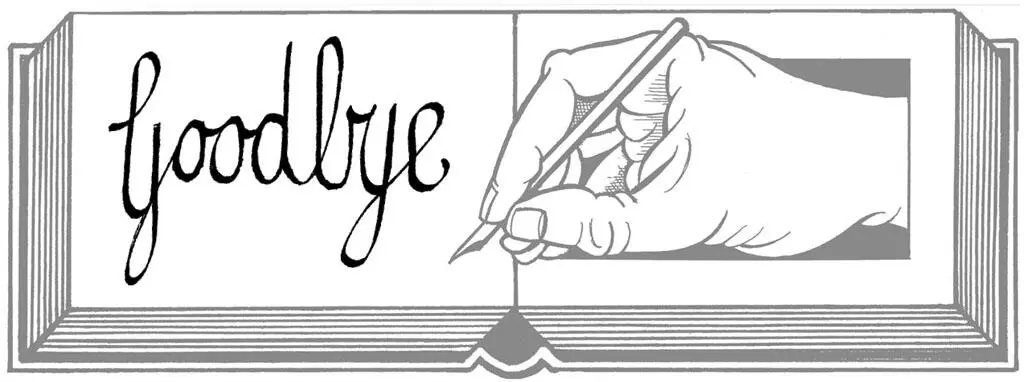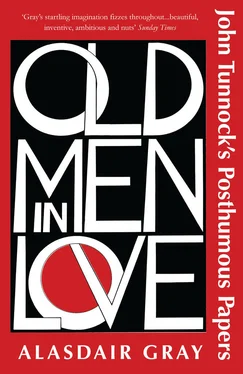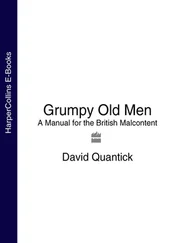Far too many have forgotten or never known that the German acronym for National Socialism is Nazi. Yeats’ The Countess Kathleen , first performed in Dublin 1902, was a bad poetic play that annoyed orthodox Catholics but scandalously excited Irish Nationalists. After the 1916 Easter Rising Yeats wondered if his play had stimulated rebellion among “certain men the English shot”. From their comfortable studies plausible authors often give murderous lunatics high-minded excuses for atrocities. Old Men in Love cunningly avoids Hugh MacDiarmid’s rabid Anglophobia; but as Billy Connolly, the New Labour Party and all respectable defenders of the 1707 Union point out, racist hatred of the English is what the Scottish lust for an impossible independence feeds upon. This book should therefore not be read, or if read, swiftly forgotten.
Goodbye, Mr Gray.
Sidney Workman
17 Linoleum Terrace
Kirkcaldy, June 2007

1 Mastermind is Tunnock’s invariable nickname for Francis Lambert, who in the 1970s achieved some fame through BBC television by doing well on a general knowledge quiz show called Mastermind .
2 This sentence introduces Brunelleschi in Vasari’s The Lives of the Great Artists translated by Julia and Peter Bondanella in the Oxford World’s Classics edition.
3 The farmer may be exaggerating the height of Athena’s statue by Phidias. A popular website says it was only 12 metres or 38 feet high.
4 Dionysus’ quarry was a cavernous space called The Ear of Dionysus , because there was a point where the owner, without being seen, could hear every word spoken by slaves working there.
5 Chapman : A Scottish literary magazine founded in 1970 by Walter Perrie but edited since 1976 by Joy Hendry.
6 No name, no pack drill is British Army slang suggesting namelessness ensures freedom. Pack drill is punishment any senior officer can impose on a soldier of lower rank, but only if he knows the soldier’s name, rank and number.
7 Blackhill: a Glasgow housing scheme built in the mid 1930s, known as a Slum Clearance Scheme because folk from the poorest areas of central Glasgow were put into it. The school where Tunnock had worked was there. The scheme was notorious for its high level of crime so was mostly demolished in the 1970s and given another name.
8 This quotation is from Antigone by Sophocles.
9 Davidson’s Runnable Stag is in many anthologies. T.S. Eliot was influenced by his Thirty Bob a Week. Hugh MacDiarmid, 18 when Davidson’s body was left by the tide on a south coast beach, said it struck him like, a bullet hole in the lands-cape, God seen through the wrong end of a telescope . In The Sign of Four Holmes gives Watson The Martyrdom of Man , saying “let me recommend this book — one of the most remarkable ever penned.”
10 Polis is Glasgow phonetic dialect for police.
11 Spud is demotic for potato: a popular article of British working-class diet, usually served boiled with meat or fried as chips. Being commonplace yet comfortably nourishing, it is sometimes used as a mild term of endearment.
12 Heraghty’s is a public house on Kilmarnock Road about a mile south of the Clyde.
13 Brother Guido, christened Guido di Pietri, received the monastic name Giovanni da Fiesole, but is better known as Fra Angelico, 1387–1455.
14 Messy Tom is an English translation of Masaccio, Italian nickname of the mural painter Tommasso Guidi, 1401-28?.
15 Granchio, better known as Nicolaus Krebs of Cusa, was the best Renaissance philosopher. He rejected Aristotle’s doctrine that mathematics deal with large and small things by saying everything was infinitely divisible in the eyes of God, so all size is relevative. Also that only God was eternal and infinite with His centre everywhere and limits nowhere — so the world and everything else was contained by God, and never at rest.
16 Vasari says that when a slave in North Africa Filippo interested his owner by sketching him in charcoal, the Muhammadan never having seen a portrait before. Eventually Filippo was ransomed and returned to Florence by way of Naples.
17 This letter was stapled to a page of John Tunnock’s diary between the last entry and the next. The writer is a left-wing historian and literary critic who taught at the Universities of Sussex and Nairobi before settling in Edinburgh, and author of The People’s War: Britain 1941–1945 and Revolutionary Empires: English Speaking Empires 1400–1780s .
18 A stickit Minister is Scots for a student clergyman who fails to qualify.
19 Calder is here over-modest. He is a competent poet with three published books of verse, the first of them translations of Catullus into Lowland Scots.
2 °Carlyle’s Life of Frederick the Great tells how King Fred’s Prussia was about to be conquered by a trio of nations when the Russian Czarina died, at which Fred’s other enemies made peace with him. Goebbels was reading this in 1945 when he heard of President Roosevelt’s death. He rushed to Hitler with the good news that history was repeating itself, and though Russian troops were in the suburbs of Berlin, Britain and the U.S.A. would now join Germany to fight the U.S.S.R. (The top Nazis believed the U.S.A. was mainly fighting them because Roosevelt was a Jew.)
21 This long dash indicates the only friend of John Tunnock who has refused permission to let their name be printed.
22 This demonstration was on February 15 th2003.
23 Protestantsinstead of protestersmay be a hint that anti-war protesters are heirs to the traditions of the 15 thcentury Reformation.
24 This story is Drinking Coffee Elsewhere from Z Z Packer’s collection of that name published by Canongate, Edinburgh, 2004.
25 This quotation is from the Bible for Today edited by John Stirling and published by Oxford University Press in 1941.
26 Many Glasgow families called the evening meal tea or high-tea , and called the mid-day luncheon, dinner . Tea was usually eaten when the wage earner came home around 6 o’clock, and contained a large main course followed by a variety of biscuits and cakes and several cups of tea.
27 From Chambers Biographical Dictionary : HARRIS, Frank (1856–1931), British writer and journalist, born, according to his autobiography, in Galway, but according to his own later statement, in Tenby, ran away to New York at the age of fifteen, became boot-black, labourer building Brooklyn Bridge, and worker in a Chicago hotel, but in 1874 embarked upon the study of law at the University of Kansas. About 1876 he returned to England and entered the newspaper world. Perhaps the most colourful figure in contemporary journalistic circles, an incorrigible liar, a vociferous boaster, an unscrupulous adventurer and philanderer, with the aspect and outlook of a typical melodrama ‘Sir Jasper’, and an obsession with sex which got his autobiography, My Life and Loves (1923-27) banned for pornography, he had a great impact on Fleet Street as editor of the Fortnightly Review, Saturday Review, Vanity Fair and of the Evening News , which became under his aegis a pioneer in the new cult of provocative headlines and suggestive sensationalism.
28 Stoor is demotic Scots for dust or muck, so Stoory means dirty .
29 See note 26.
30 Kelvin Aqueduct, Maryhill: architect Robert Whitworth, built at a cost of £8509 in 1787-90, 400 feet long and 70 high, then the largest canal aqueduct in Britain. Four rusticated arches of 50 feet carry spandrel walls horizontally arched from the massive cut-water buttresses needed to contain the waters of the Forth and Clyde Canal.
Читать дальше













